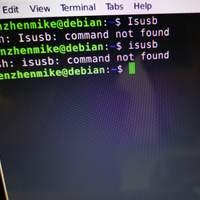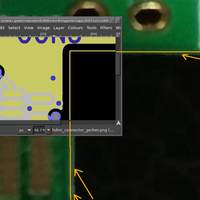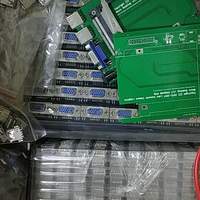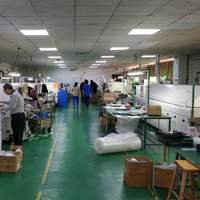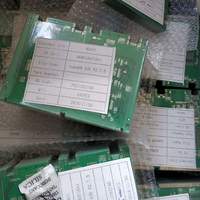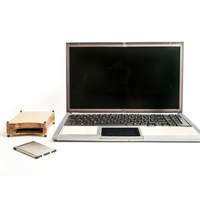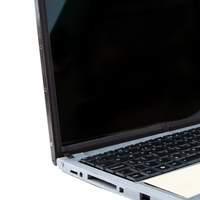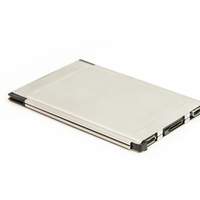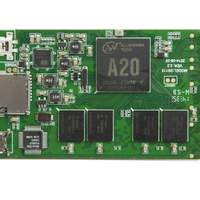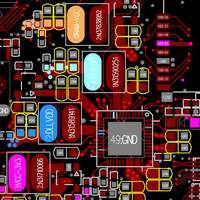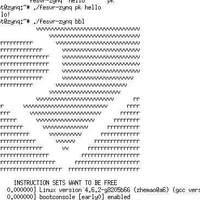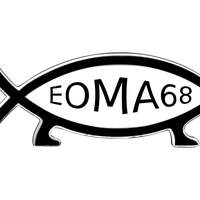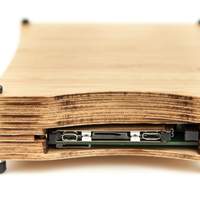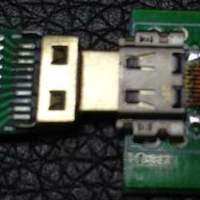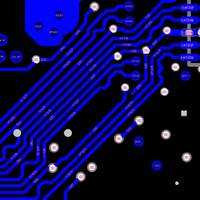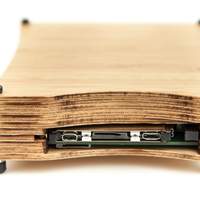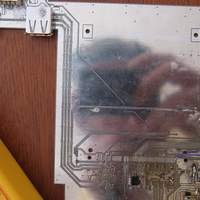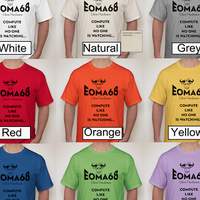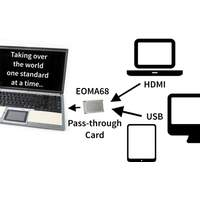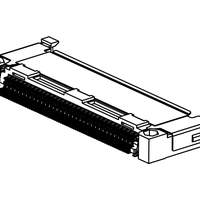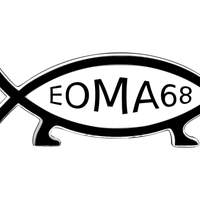100 A20 Computer Cards Ready for Testing
Long story short, Mike's successfully done a production run of 100 EOMA68 A20 Cards, and sent two of them to me in the UK and five to Chris of ThinkPenguin, for testing. Read the full update.
Command Not Found
Mike, the young factory owner with an economics degree, first-time ever as a user and tester of GNU/Linux systems, does remarkably well. Read the full update.
Coronavirus and a Plan for PCB Testing
Coronavirus fear kicks in, and we have a plan for dealing with the 100% failure on the preliminary production run. Read the full update.
Measurements and a Hypothesis
Though I'm now in Canada, which means I don't have access to much test equipment, Mike is extremely supportive, and has hired an engineer, in Shenzhen, to investigate on our behalf. Read the full update.
Faulty Power Regulators
A power regulator is inexplicably not working, so we'll need to replace it. We'll get there, one step at a time. Read the full update.
Report Back from Factory on HDMI
In manufacturing the first batch of 100 boards, we ran into a problem with the edges of the PCB accommodating the micro HDMI connector. Read the full update.
2.7.5 Cards Under Way, NLnet, and Intel Compute Card
Intel stops the Compute Card. Mike has started the EOMA68-A20 Cards, and soldering connectors on the Micro Desktops. NLnet Foundation looking for a way to fund EOMA68 within their remit. Read the full update.
500 Micro Desktop PCB Assemblies
Just a brief update: Mike has ask his staff to assemble the Micro Desktop boards. These are the simpler of the two boards, so all of the Micro Desktops are being done, whereas explained in a previous update, the more complex board, the EOMA68-A20, will only be done in a smaller test run of 100 at first. Read the full update.
New Factory Equipment, New Grant Proposal
Mike buys a lot of new manufacturing equipment, the test run of 100 will happen after Chinese New Year, I apply for a new privacy-focussed grant. Read the full update.
2.7.5 Manufacturing, Spectre Analysis
Manufacturing has been delayed until March. In the meantime, here's an analysis (and good news) of how the Spectre security vulnerability might affect the A20 and other EOMA68 computer cards. Read the full update.
What do 1,000 EOMA68-A20 PCBs look like?
This is so under-dramatic. You'd think that 1,000 PCBs would take up more space. Read the full update.
PCBs and Components Have Been Ordered
Mike has placed the order for 500 Micro Desktop PCBs and 1,000 EOMA68-A20 PCBs. The last of the components have been ordered and are on the way. What follows is a summary of what's to be delivered. Read the full update.
Test Run of 100 A20 Cards and Contract Work
After an unfortunate stint of contract work, I'm back in Taiwan. A test production run of 100 units EOMA68-A20 Card is planned. All components for the Micro Desktop have arrived. Mike is checking deliveries made to the factory over the past few months to ensure that all components for the EOMA68-A20 Card have also arrived. Read the full update.
2.7.5 Samples received - DRAM is OK, Micro HDMI to confirm
It's been an extremely hectic month what with visiting Barcelona for the 8th RISC-V Workshop and finally procuring DDR3x8 DRAM. Card production is finally underway and we now have a realistic target for delivery. Read the full update.
DDR3 RAM and a Libre RISC-V SoC
Sourcing DDR3 RAM proving to be interestingly challenging; Libre RISC-V SoC underway. Read the full update.
FOSDEM Recap, RISC-V Update, and Certification Marks
Thank you to absolutely everyone who came to FOSDEM. RISC-V gets interesting. A reminder that EOMA68 is a Certification Mark. EOMA68-A20 card supply chain progress. Read the full update.
FOSDEM 2018, Shakti Project Tape-out Nearly Done, 2.7.5 EOMA68-A20 PCBs
Brief update this time as it's nearly time to get to Taipei Airport. Am on the way to Brussels - a little early - so as to be reasonably timezone-synced for the 2nd, 3rd and 4th. Read the full update.
EOMA68-A20 2.7.5 Gerbers Off to Factory; Thank You to Everyone for the Sponsorship
So, finally, the HDMI Review is complete: the Gerber files have been sent to the factory for PCB manufacturing. Estimates can now be made (between five to seven months) until shipping. There's been a great response from people with donations and sponsorship. Read the full update.
HDMI Review and Thank You
The pre-production EOMA68-A20 HDMI Revision 2.7.5 review is nearly complete and the capacitors replaced; Thank you to everyone who's helped with funding. Read the full update.
Keeping 100 Ohms HDMI Impedance; RISC-V 64-bit Libre SoC anyone?
The HDMI taper turns out to be a red herring, an alternative approach is needed; An anonymous sponsor donates a ZC706 for developing a libre 64-bit RISC-V SoC. Read the full update.
A Tale of Two Tools
In which the Saga of Shenzhen Maker Faire unfolds; drastic capacitor price hikes; HDMI, FOSDEM. and a libre RISC-V 64-bit SOC design. Read the full update.
Shenzhen Maker Faire 10-12 November 2017
This update is primarily about the imminent Shenzhen Maker Faire 2017. The HDMI review continues (leaving time for SZMF). A particularly insightful and revealing conversation takes place on the Reprap Forum. Read the full update.
PCB and 3D Printer Progress
So, good news: the low-cost test PCB with the JAE DC3 Micro-HDMI connector came back successful; a trip to HK yielded some parts for the new printer (which is awesome); some planned trips; With the test PCB ok, the 2.7.5 pre-production test can go ahead. Read the full update.
2.7.5 HDMI Review Status; 3D Printer MK2 Reaches 3rd Prototype
In Which We Travel At The Speed Of... A Mailing List (very very carefully); In Which We Learn How Not To Go About Designing 3D Printers. Read the full update.
A20 2.7.5 HDMI Design Review, 3D Printing Underway
A very kind offer of some research into high-speed differential pairs is currently underway on the mailing list and there's been a "down-the-rabbit-hole" moment of focussing on 3D printer design. Read the full update.
2.7.4 EOMA68-A20 Cards Arrived
Thank you to everyone who responded about the 3D printing: a special update is being drafted. The pre-production EOMA68-A20 revision 2.7.4 samples arrived and have been tested. Decisions need to be made on how to deliver OSes to people. Read the full update.
Existential 3D Printing Moments
The EOMA68 project has a lot of 3D printing to do! This update describes some of the challenges, progress, and alternate approaches. Read the full update.
Taiwan, Micro Desktop Casework, Laptop PCB1, and A20
We've been in Taiwan for over a week: the new 1.7 Micro Desktop PCBs arrived and are fine, the casework is underway (a cheap-and-cheerful 3D printer sourced), Laptop PCB1 can go for prototyping, and fun and games with NAND Flash on the A20. Read the full update.
Complexities of Hardware, Progress, and Travel
This update sheds some light on the complexities of this entire project, summarises the status of the main portions of the project, and announces our travel plans. Read the full update.
You Can't Bring Electronics into China
Special update, jumping the queue slightly, which can be summarised as "You Can't Bring Electronics Into China". Read the full update.
Assembling PCBs at "Home"
The production schedule has been pushed by 10 weeks, the first RK3288 PCB has been assembled using "home office" equipment, likewise the Pass-through Card. The latest pre-production EOMA68-A20 will be done likewise. Plus a recap of other recent activities. Read the full update.
Progress, Physics, Taiwan, and More
In this update, I bring you up to speed on... everything! Read the full update.
A20 Prototype progress, RK3288 PCB CAD complete, and more.
This is a big update: a lot has been going on, with bursts of activity and the need to adapt to changing circumstances. *the move to Zhuhai went well; *A20 prototype test board is being made; *the RK3288 PCB CAD is complete; *the U.S. election risked disrupting the campaign; *world-wide DDOS attacks dramatically slow down communications; *new development laptop needed; *visiting Taiwan. Read the full update.
Latest from Shenzhen
Pre-production prototypes of the Microdesktop and EOMA68-A20 boards were initiated last month, samples were completed last week and tested. Short version: another pre-production run is needed. Read the full update.
Zhuhai to Shenzhen
This update covers: returning from Zhuhai to Shenzhen, meetings with Nexell that went extremely well, the production plan for the EOMA68-A20 and Micro-Desktop with Mike currently doing the PCBA. Read the full update.
Observations from Zhuhai
This post is a little bit more about my personal experiences and observations of being in Zhuhai, China. Read the full update.
Post-Shenzhen Reflections
As I was going back over my previous update on my visit to Shenzhen, it suddenly hit me: everything I've done over the past five years - the entire EOMA68 design ethos - is vindicated by this one visit to Huaqiang Road. Read the full update.
Update from Shenzhen
This update is about being in Shenzhen for the past few days, during their October National Holiday. In summary, I know now why it's been so damn difficult to get anything done from outside of China: it's the incredibly poor internet access. Read the full update.
End of September Update
Summary of the past ten days and updates on several threads. Read the full update.
Chips, Prototyping, and Being a Good Houseguest
We’re staying with a friend in Hong Kong as we oversee progress on the laptop's PCBs. The revised EOMA68-A20 was submitted for prototyping and may actually be ready within under ten days. Enquiries are still outstanding for tracking down a S5P6818 Reference Design. Read the full update.
Progress and Events
Here’s an update on the past couple of eventful weeks. A plan of action (in development) has been started in a bugtracker, flights are booked to HK, we're doing the t-shirts before we leave, we dealt with the DDR3 RAM upgrade and sent it off for prototyping estimates, we sorted out revision 1.4 of the Microdesktop layout, and we spent an enormous and disproportionate amount of time dealing with Wikipedia. Read the full update.
Thank you!
The past week was an amazing rush, passing and exceeding the funding target with your help, and even now it's still climbing. Read the full update.
Product Roadmap
This update lays out the roadmap for the EOMA68 project and what the future holds for modular, eco-conscious, libre computing. Read the full update.
FSF RYF Background
The Free Software Foundation (FSF) posted an article on August 10, 2016 entitled "Support the Libre Tea Computer Card, a candidate for Respects Your Freedom certification." Read the full update.
The Opposite of the EOMA-68 Modular Laptop
I asked David if he would write a guest update about his experiences of dealing with an older laptop. The complexity of the design contrasts greatly with that of the EOMA68 15.6" Laptop Housing. Read the full update.
FSF, FSFE, and Off-grid Living
Hello! I have three bits of news for you. Read the full update.
AZERTY STM32F072 Keyboard
Albert, who only joined the arm-netbook mailing list a few short weeks ago, has been helping with the keyboard firmware. He's very kindly made a short video of the STM32F072 providing AZERTY (French) keyboard support, which he wrote. Read the full update.
Speedy Devuan
After running the libreoffice, printing and web browsing updates with associated videos on Parabola-Arm GNU/Linux-libre, the performance was less than modest. In complete contrast, when running the exact same programs under Devuan, the difference in speed is staggering and so noticeable as to be worth doing a separate update. Read the full update.
Web Browser Performance
People have been asking what the web browser performance is like on a $7 dual-core A20. Here's an honest appraisal and some tips. Read the full update.
T-shirts
We've added a geek-friendly T-Shirt to the options: this quick update covers the sizes and colours Read the full update.
Cedrus GPL Video Encode/Decode
I am delighted to be able to announce that the Cedrus fully-GPL-compliant accelerated video encode/decode libraries work out-of-the-box on the EOMA68-A20 Libre Tea Computer Card: 1920x1080 at 60fps (1080p60) works great, full-screen. As the CEDAR Reverse-engineering is an FSF High Priority Project this is a big deal. Read the full update.
Free Talk Live
We've just done a show on Free TalkLive here in Keene, NH, see the video from the studio. Read the full update.
Gimp, LibreOffice and Printing
We've been asked to demonstrate LibreOffice, Gimp and also took the opportunity to show printing (in this case using a networked HP Laserjet). Read the full update.
Support Scenario
We asked on the mailing list if people could come up with examples where EOMA68 could be used by people with more computing experience to make it easier and less costly for them to support friends, family and clients. What we weren't expecting was an actual real-world scenario to occur during the campaign. Read the full update.
GCompris Educational Suite
Lilyana and I are having great fun at the moment, crashing boats, submarines and satellites thanks to gcompris running on the Libre Tea Computer Card. Read the full update.
Sugar OS Demo
This is a quick - and very honest - demonstration of the Sugar OS of OLPC fame running on an EOMA68-A20 Computer Card. Read the full update.
Milestones
Thanks to everyone's help we reached an important milestone yesterday evening: USD $50,000 from over 500 pledges. Read the full update.
More OS Options!
We're adding two new OSs to the pre-installed option: Devuan and Fedora 24. These are now available (look right and scroll down), and we will be evaluating more OSs, including in particular SUGAR and FreeBSD. Read the full update.
Pass-through Card
One of the ideas for EOMA68 Cards that's been in the cards (pun intended) for some time is a Pass-through Card. The possibilities for this Card are really exciting, so we decided to add it during the campaign. Read the full update.
Mainline U-boot and Kernel
The EOMA68-A20 Computer Card has been using the older u-boot and sunxi-3.4 kernels for some time. This update shows a recent mainline u-boot (2016.07) and a sunxi-next near-mainline 4.7.0-rc5 Linux kernel. Read the full update.
Hope Conference 2016
We're currently at Hope 2016 with Think Penguin here in New York, Seva Epsteyn kindly did a live video for us to show the computer card, laptop housing, and micro-desktop. Read the full update.
Devuan Demo
With Fedora 24, Debian, and Parabola already on the list, Devuan we felt was important addition to have, due to the "hassle-free" ethic inherent throughout this campaign. Read the full update.
Feedback from Backers
In speaking with people on the mailing lists and various forums, we're getting a lot of questions from people new to the EOMA68 concept. After answering Nick's questions about how to set up ultra-low-power servers using EOMA68 Computer Cards, he had these kind words to say... Read the full update.
Laptop Comparisons
Over the years there's been quite a few innovative laptop projects out there, including from mass-volume suppliers: a bamboo laptop, a recycleable one, an engineer's laptop, and many more. In this update I'd like to go over them all as a way to distinguish the EOMA68 Laptop Housing, as well as illustrate how this project has learned from them all. Read the full update.
Fedora 24
Fedora 24 is up and running on the EOMA68-A20 Computer Card! We have yet to pick a name for it (suggestions welcome) however it's still worthwhile letting people know about: a quick video demo is available. Read the full update.
Questions and Debates
I thought I'd share with you how amazed and delighted I am at some of the questions and debates that this project has raised. Read the full update.
STM32F072 firmware: AZERTY and other keyboards
Thanks to Albert for contacting us and agreeing to help out via arm-netbooks. He contacted me last week to ask if it the laptop would have AZERTY keyboard support. As this is a libre project, I explained to him the process, not realising that he was an embedded hardware engineer. Read the full update.
PCMCIA/EOMA68 Breakout Board
We've had a number of people, many of you electronics enthusiasts and makers, ask how to connect to the EOMA68 Computer Cards for use in your own electronics projects. We do have some GPIO pins on the Micro Desktop... Read the full update.
3D Printing the Laptop Parts
Thanks to Demon3D of the Reprap community we can show you a time-lapse video of one of the laptop's parts being 3D-printed. The video shows the back left base part, which, thanks to having internal arches that were modelled on those used in Gothic Cathedrals, is incredibly strong despite a wall thickness of only 1mm and an overall length of 160mm. Read the full update.
Picking a Processor
We've had a lot of people asking about alternative processors; a lot of suggestions on what we should be making available in EOMA68 form-factor, as well as quite a lot of criticism for only having a Dual-core ARM Cortex A7 1.2ghz. The list of checkboxes needed to be ticked for an ethical eco-conscious Computer Card is really quite long: no NDAs, full sources, no spying built into the hardware, reference designs available, datasheets, and much more, so we thought we'd take you through some of the top ones. We'll also put in some estimates for costs both in time and financial terms. Read the full update.
Cable Set Now Available: Standalone Libre Tea Demo
After ordering a slough of parts, including one of the obscurely-named On-the-Go Host-Charger cables which we finally found, we've been able to test and verify the two cables needed to turn any Computer Card into a standalone computer, without the need of either of the Micro Desktop or Laptop housings. We've added it as a pledge level to the campaign Read the full update.
Merchandise
We've had some people notice that there's no stickers, mugs, t-shirts and so on... Read the full update.
MOQs
I thought it would be nice to do an assessment and give you some insights into how we came up with the pledge levels. The pledge levels have been based on a minimum order quantity (MOQ) of 250 units. Ordering PCBs and components is odd: there are fixed setup and teardown costs which don't change no matter how many PCBs you get made, and the components that are soldered to the PCBs can come in reels of 2,500 or trays of 100. Ordering a partial reel is so time-consuming and inconvenient it's just not worth it. All this basically means the smaller batch sizes are much more expensive per unit than larger batch sizes: ten times the cost is not uncommon. The problem is nobody would buy a $50 computer if it cost $500. That's where crowdfunding comes into its own. Read the full update.
Standalone Computer Cards
While a Computer Card can certainly slot into the micro desktop and laptop housings, it can also be run on its own with the addition of a some basic cabling. Read the full update.
First Update + Demo
It's been only two days and already we're up to 9% of our target, which is fantastic - thank you! Read the full update.
